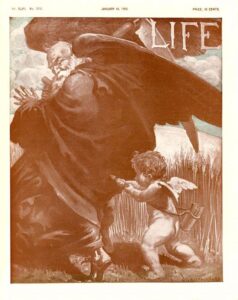I never looked forward to the first Friday’s Elk of the year like this one. When I reread 2020’s first newsletter, it feels as if it comes from an alternate universe, where tales of human evolution and monarch butterflies weren’t crowded out by a planetary shock brought on by a virus. It’s weird to realize that by the time I was writing that newsletter in January 2020, the coronavirus was a few months old, spreading through China and beyond. It didn’t even have a name yet, but the die for 2020 was already cast.

I spent December 2020 reporting on the pandemic, as I have since March. This final month of the year gave me a chance to reflect on where we’ve come in Year One C.E. (Covid Era), and what Year Two C.E. will be like.
When I started the coronavirus vaccine tracker with Jonathan Corum back in June, it felt like a convenient way to keep tabs on assorted projects just getting underway. But it quickly evolved into a combined chronicle and encyclopedia of what will be remembered as one of the most important episodes in the history of science. One by one, vaccines went into clinical trials. Some stalled, and one was abandoned.
But others progressed to the large-scale Phase 3 studies that can show if they’re safe and effective. In November, Pfizer and BioNTech provided the first evidence that a vaccine could indeed fight the coronavirus. Moderna soon followed, as did AstraZeneca. In Russia, Sputnik V showed promise, while China’s Sinopharm and Sinovac candidates looked as if they might work–although the detailed data from their Phase 3 trials have yet to come out. Country after country began granting emergency authorization or outright approval.
Jonathan kept deploying new design skills to keep up. We added maps to show where people are getting the vaccines. We created a collection explanatory illustrations to show how each vaccine works. (Here’s AstraZeneca, Johnson & Johnson, Moderna, Novavax, Pfizer-BioNTech, Sinopharm, and Sinovac.)
December brought photographs of people getting vaccinated across the United States and in other countries. I had dreamed of such a moment in the spring, but I considered it a fantasy to indulge rather than a firm prediction. Incredibly, though, the vaccines turned out to work very well.
At least they worked in the careful confines of a clinical trial. But vaccines don’t save lives. Vaccination campaigns do. The first three weeks of vaccinations have fallen catastrophically short of promised targets. Last month Operation Warp Speed leaders said that 20 million people would be vaccinated across the United States by now. As of December 30, the CDC has recorded fewer than 2.8 million Americans getting a shot.
Strained public health care systems are one reason for the delay. It’s a bizarre waste of resources to spend over ten billion dollars developing vaccines, and then set aside just a few hundred million to help with distribution. It didn’t help matters that the first vaccines to get authorized required ultracold freezing.
When it comes to distribution and cost, there are better vaccines in development–vaccines that only require one shot instead of two, that cost only a few dollars per dose, that can be kept refrigerated instead of frozen, that come in pills or sprays instead of shots. In 2021, I’ll be following these up-and-comers on the vaccine tracker. But they have yet to go through trials to prove they’re safe and effective. Going into 2021, we have to ask, who will want to risk getting a placebo rather than lining up for the real thing? If we’re lucky–again–it may be possible for vaccine developers to skip the placebos and measure the success of new vaccines with nothing but a blood test.
Meanwhile, the virus has rebounded to spring-like levels both in the United States and beyond. More people getting sick means more replicating viruses. More replication means more mutations. And more mutations mean more opportunities for the coronavirus to change in dangerous ways.
In December, a variant emerged in the United Kingdom with 23 mutations distinguishing it from the first SARS-CoV-2 samples found in Wuhan a year ago. Some of those mutations appear to have turned it into a far more contagious virus. I’ve been helping cover the spread of B.1.1.7, which was first detected this Tuesday in the United States. It could potentially lift the winter surge to even greater heights, requiring even stricter controls to slow its spread. Dramatically increasing vaccination could potentially spare many future victims of B.1.1.7. But if our slow rollout so far is any guide, we may not be up to the challenge.
I’m still guardedly optimistic that summer 2021 will bring back some of the joys we learned to do without in 2020. I think prognostications from reporters like Donald McNeil Jr.and Ed Yong are well considered. But this virus has exploited our assumptions and our wishful thinking so many times already that I am not buying airplane tickets any time soon. For the next few months, I will instead stay at home and continue to help chronicle the exhaustingly interesting news.
That’s all for now. Stay safe!
My next book is Life’s Edge: Searching for What It Means to Be Alive. It’s coming out in March 2021, but you can pre-order it now. You can find information and ordering links for my thirteen other books here. You can also follow me on Twitter, Facebook, Goodreads, and LinkedIn. If someone forwarded this email to you, you can subscribe to it here.
Best wishes, Carl
Originally published January 1, 2021. Copyright 2021 Carl Zimmer.
